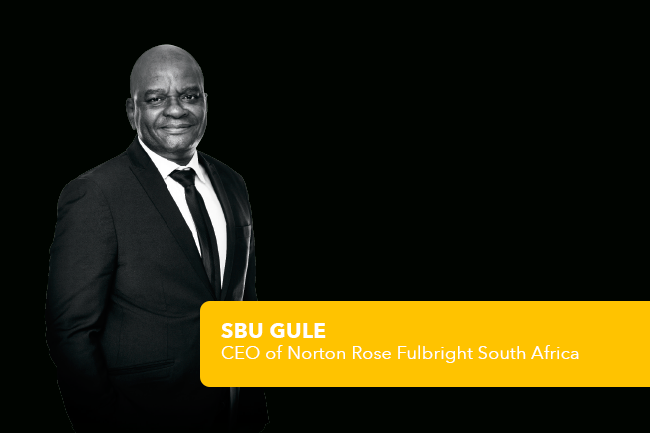‘Don’t chase the money. Do the right thing,’ says Sbu Gule, before adding: ‘And the money will follow.’ This may not be the typical advice one would expect from the CEO of a top international law firm and its first African global chairman – a man, who has represented professionals from 52 international offices, and is the trusted adviser of some of South Africa’s largest parastatals and listed corporations. But Gule, who took over as chief executive of Norton Rose Fulbright South Africa in April 2018, is not your typical lawyer.
His impressive career has taken him from representing clients at the Commission for Conciliation, Mediation and Arbitration to being elected president of the Law Society of the Northern Provinces and becoming the CEO of the South African office of a global law firm. All along the way, he has been guided by his moral compass, navigating him towards his field of specialisation – labour and employment law – and providing direction for his strong sense of social justice.
Gule urges the legal fraternity to act as moral custodians of society and lead the country in corporate governance and transformation. ‘One should not be thinking of lawyers as just sitting behind their desks and waiting for work to come to them,’ he says. ‘We have a moral imperative to change the socio-economic fortunes of this nation, which means we all have to put our shoulders to the grindstone.’
One way of doing this is by growing young black legal talent through skills development, training and mentorship. ‘The slow pace of transformation within the legal profession is one of the challenges we currently face in South Africa, especially in terms of race, gender and diversity,’ says Gule.
The introduction of a contemplated national community service for candidate attorneys, as laid out in the Legal Practice Act (LPA) of 2014, would provide a broader access to legal services and boost the transformation agenda.
‘I certainly think there is a role to be played by young people doing community service,’ he says. ‘I’m not quite sure how it’s going to pan out, as the LPA has not yet come into effect. However, community service is not a one-way street. While it gives the poor and indigent access to justice, it also helps young attorneys develop their skills and gain professional experience. But in order for it to succeed, senior practitioners will need to support these young colleagues, giving them guidance and mentorship. We wouldn’t want to unleash young graduates straight from university, without practical experience in law, on unsuspecting members of the public.’
He argues that the legal fraternity – and ultimately professionals across all economic sectors – should agree to this kind of sacrifice as it’s likely to lead to broader socio-economic empowerment and, ultimately, to personal growth. Here Gule mentions the benefit of greater maturity. ‘Once young attorneys have completed their community service, they may find it easier in the job market, not only because of their technical experience but also in terms of their emotional growth and improved EQ.’
Norton Rose Fulbright places great emphasis on developing its own commercial lawyers and gives them exposure to jurisdictions across the globe and sub-Saharan Africa. The firm has offices in South Africa, Tanzania and Morocco, and alliances with legal practices in Uganda, Kenya, Burundi and Zimbabwe.
‘Much of our growth is happening in East Africa,’ says Gule. ‘I want our talented young lawyers to lead the work and grow along with the firm in these geographies and economic sectors – which at present include anything from renewable energy, oil and gas to infrastructure, healthcare as well as telecommunications and ICT.
‘The transactions are usually multi-jurisdictional – where, for instance, the funder is from Europe, the main transaction takes place in Kenya and part of it in South Africa. This type of work enables our young commercial lawyers to become very experienced international lawyers by the time they get to mid-life.’
Norton Rose Fulbright’s international platform has another massive advantage, according to Gule. ‘International law firms have access to a large number of international clients. As commercial lawyers we should become ambassadors for South Africa and tap into our worldwide network to identify potential overseas investors.
‘Despite the often negative narrative around South Africa’s economy, there are many areas where foreign investors can achieve an excellent return on investment, for instance the mining sector.’
It is, however, crucial for private-sector law firms to engage with government to iron out regulatory uncertainties and create a healthy environment for foreign investors. ‘Everybody needs to be on the same page if we want to make South Africa a safe destination for overseas investment,’ says Gule. He gives the example of the CEO Initiative, which has seen chief executives of top companies listed on the Johannesburg Stock Exchange as well as smaller companies collaborate with government and labour to drive economic growth and development. ‘No one is going to change the fortunes of this country except the people of this country,’ he says. ‘We need to send a strong message to investors that South Africa is open for business.’



